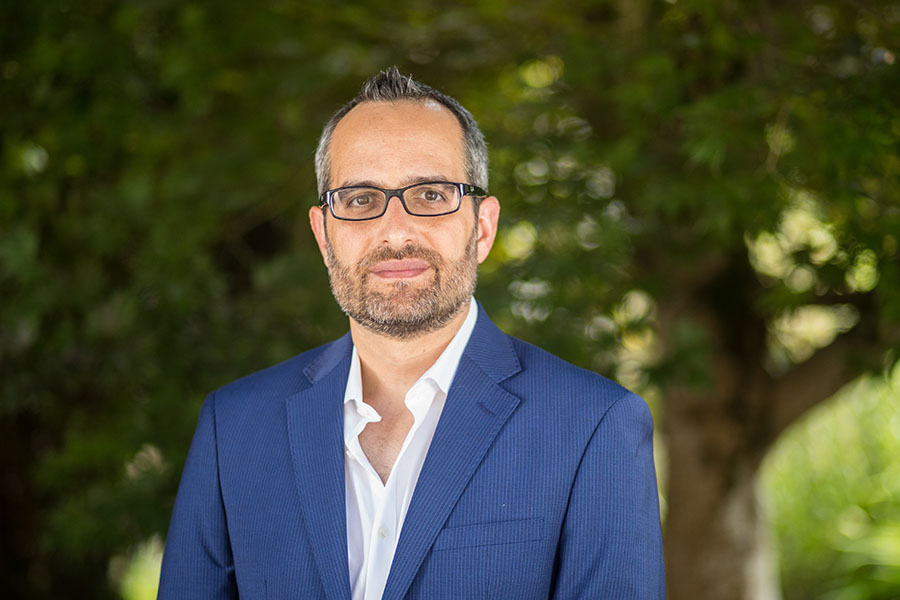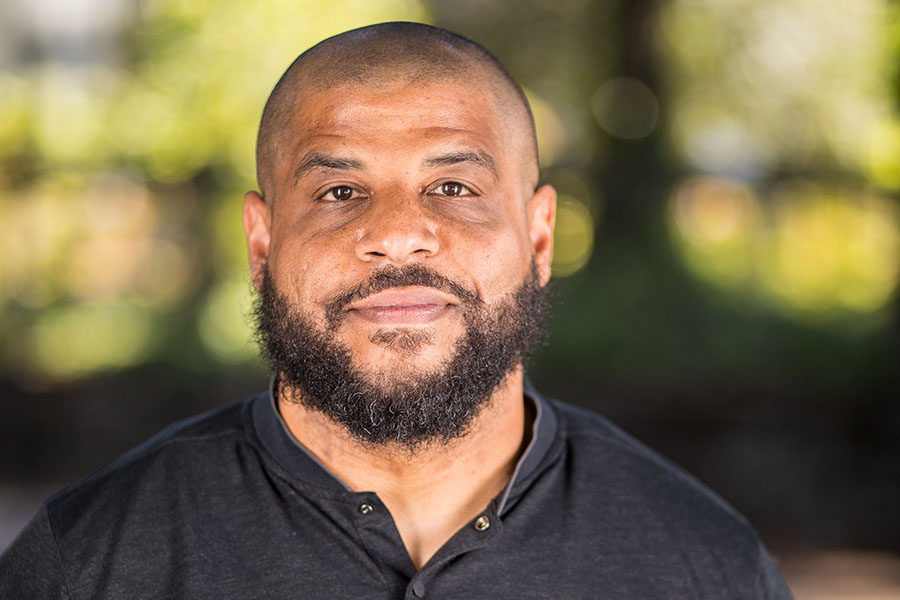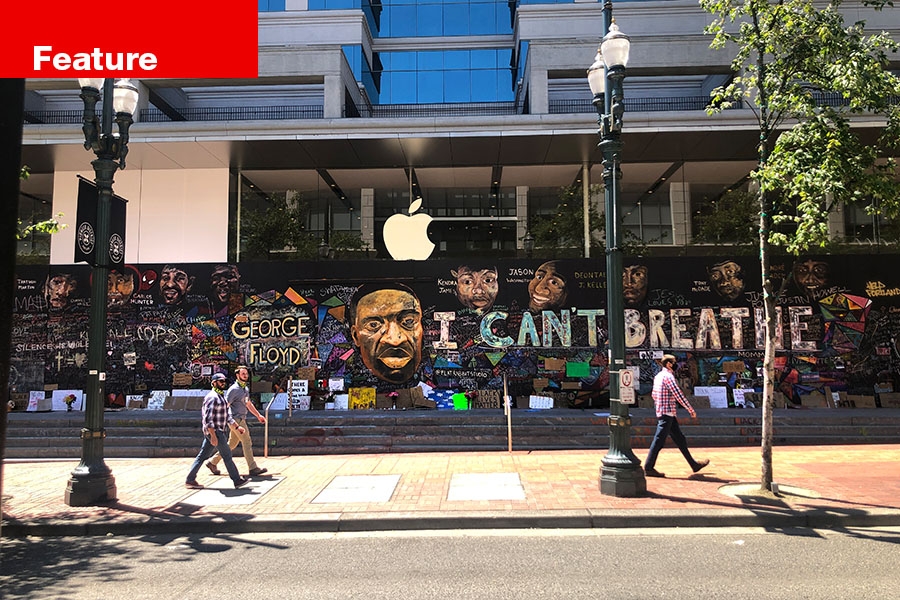COVID-19 exposes long-standing wounds of systemic racism.
Five years ago, Southwest Portland resident Todd Khozein was given a 5% chance of living for more than two months. The cancer that threatened his mortality led to a mind shift that informs his thinking about how both an economy and a society work similarly to the human body.
“If one of your organs is sick, it’s not just a problem of the organ but a problem of the whole body,” says Khozein, co-chief executive officer of SecondMuse. His global company, with 13 offices around the world, helps construct social-justice-focused economies for governments, corporations, foundations and entrepreneurs. “You cannot oppress a part of your body and expect there not to be consequences to the whole.”
 Todd Khozein, co-chief executive officer of SecondMuse Photo by Jason E. Kaplan
Todd Khozein, co-chief executive officer of SecondMuse Photo by Jason E. Kaplan
Enter the COVID-19 pandemic, which suddenly lifted the disparity veil, revealing generations of U.S.’s purposeful investment into intentional and historical racial inequity, particularly against African Americans. Recent protests around the country — including Portland’s months-long, daily demonstrations — commanded the world’s attention toward this collective crisis of conscience.
Now, although the Black Lives Matter movement is building the proverbial muscle of businesses, nonprofits and individuals toward addressing generations of racial inequity, the so-called holistic medicine that will help this country work for all, Khozein notes, demands a response that is more meaningful than a Black Lives Matter lawn sign. Or a hired consultant’s well-crafted equity statement posted on a company’s website.
In the past two months, historical efforts rooted in racial justice have resulted in large commitments to Black residents in Oregon. The $62 million Oregon Cares Fund, which passed the state Legislature on July 14, is a racially targeted investment from the federal CARES Act Coronavirus Relief Fund.
The campaign for that investment — which will be solely distributed to Black residents, businesses and nonprofits — was led by the state’s handful of current and former Black legislators and a diverse group of dozens of other individuals.
That same day, Meyer Memorial Trust pledged $25 million over five years toward advancing racial equity at the community level. Meyer’s president and CEO, Michelle J. DePass, noted Oregon’s anti-Black and anti-Indigenous history as part of her motivation for strategically investing in Justice Oregon for Black Lives, Meyer’s largest initiative in its 38-year history.
“Justice is not simply an ideal,” DePass said in an official statement. “It is something Oregonians should expect to see in our everyday lives.”
Martha Richards, executive director of a smaller philanthropic foundation, Portland-based James F. And Marion L. Miller Foundation, says she had been struggling with how to make bolder moves to support the state’s underserved communities, considering the foundation’s exclusive focus on arts and education.
So earlier this year, when Marcy Bradley, a program officer for the Oregon Community Foundation, asked Miller and other philanthropic foundations to contribute to a fund focused on building the success of Black students around the state, Miller seized the moment. Bradley asked Miller for a commitment of $100,000 for one year to help get the initiative off the ground. Richards countered with $200,000 over two years.
“We’re small and I thought that would influence others to be supportive,” Richards explains. Her strategy worked. Bradley ended up raising more than $750,000 from Miller, Meyer, and several other philanthropic organizations to create the inaugural Oregon Black Student Success Community Network.
The fund, which was announced June 5, supports the creation of a network of 20 Black-led, community-based organizations to serve as a think tank for how best to serve the needs of Oregon Community Foundation’s count of more than 31,500 Black students spread around the state’s eight geographic regions.
“It’s really important work,” Richards says, “and it was important then and it’s more important now. We’re relooking at all of our grantmaking with an eye toward equity now.”
Portland metro-area businesses large and small, including Oregon’s largest sports-apparel companies, are also making unprecedented commitments to economically boost Black people, employees and communities. On June 5, Nike announced a pledge to invest $40 million over the next four years “to fight systemic racism.”
Five days later, Adidas North America pledged $120 million over four years, and also committed to filling 30% of its job openings with Black and Latinx applicants. In a June 10 company tweet, Adidas acknowledged that its financial success “would be nothing without Black athletes, Black artists, Black employees and Black consumers. Period.”
Smaller businesses are also making bold decisions to advance racial equity. In late July, Northeast Portland-based henry v, a 40-year-old experiential marketing and creative-services agency, announced a pro bono initiative called For the People, which was a commitment to provide at least $100,000 worth of its storytelling and marketing services to a Black-led project or business for a year.
After a brief application process in late July, henry v selected the Black Resilience Fund, co-founded by social-justice activists and volunteers Cameron Whitten and Salomé Chimuku.
In less than two months, the volunteer-run fund raised almost $1.3 million from more than 14,000 donors. The money, doled out in average chunks of $300, without much red tape or explanations, is intended to help Black people pay bills, buy groceries or pay their rent, which Whitten says helps “foster hope, resilience and healing.”
“Witnessing the widespread protests in response to the death of George Floyd, we acknowledged a need, as a business and as individuals, to uplift our community with more consistent action against racial injustice,” says Haven Anderson, the company’s executive creative director. “We launched For the People to amplify the voices of those creating positive change by doing what we do best: telling stories.”
The outpouring of businesses’ targeted dollars to the Black community has revealed long-standing, deeply underserved needs — exacerbated by COVID-19’s financial impacts on small businesses and individuals.
Mercy Corps Northwest, for example, decided to offer Black-owned businesses in the Portland metro area up to $5,000 for “rent, payroll or other operational expenses.” The application process was opened at 8 a.m. on July 20 and closed at 5 p.m. July 22. Despite a limited outreach, given the brief time frame, Mercy Corps received more than 500 applications, according to its communications director Leigh Scheffey.
“We know our community needs money as urgently as possible, as more businesses are at risk of closing each day with delays in unemployment and other benefits,” Scheffey says. “More money is needed to support Black-owned businesses, and we are actively accepting donations to grow the pool of relief we can offer.” In early August, the organization said it planned to disburse a minimum of 20 grants to businesses over the next few weeks.
Meanwhile, Prosper Portland, whose mission is to encourage economic prosperity, struggles to make remarkable progress on its equity-based commitments in its own workplace and in partnership with other companies. In 2016 it changed its name from the Portland Development Commission to Prosper Portland, in part to distance itself from its legacy of accelerating the gentrification of the neighborhoods historically occupied by Blacks and other people of color.
That same year, when Kimberly Branam was hired as its executive director, she vowed to help “transform Prosper Portland into an antiracist organization.”
Today the Prosper Portland staff and board of commissioners are diverse, and an in-house equity council is tasked with using training, facilitation, informal meetings and awareness-raising to change the culture of Prosper Portland’s workplace.
Branam acknowledges more needs to be done internally to make the overall organization and its individual employees more sensitive to issues of race, privilege and inequity. Branam says she is also trying to figure out how to encourage tech companies, one of the fastest-growing industries in the state, to be more racially inclusive.
“It’s fundamentally about culture change,” Branam says. “Thinking about it as an economic system, in order for it to be healthy, it has to be diverse.”
In 2015 Prosper Portland partnered with the late Sam Blackman, CEO and founder of AWS Elemental, in launching the TechTown Diversity Pledge. Branam called it “a practical, meaningful tool” to encourage the metro area’s tech companies to hire more women and people of color.
Years later, though, a majority of companies involved have made almost no discernible progress in meeting the pledge’s equity goals. In fact, some of the participating partners “chose not to publicly affirm Black Lives Matter,” noted Prosper Portland’s economic director, Tory Campbell, in a recent letter to tech companies.
“Fundamentally,” Branam acknowledges, “the accountability structure was not there.”
So this fall, she says, Prosper Portland will release another version of the TechTown Diversity Pledge that will require tech companies — which volunteer to participate — to disclose data on employees’ ethnicities and agree to engage in diversity training.
It will also dedicate Prosper Portland staff to figuring out how to evaluate success and how to keep tech companies accountable to its equity goals.
“We are still a product of our history, and that history is steeped in white supremacy,” Branam explains. “We have been working on culture change in earnest for the last five years, and we still have challenges. We will keep pushing even though we haven’t figured it all out.”
PitchBlack founder, economist and entrepreneur Stephen Green says he is growing increasingly impatient with the business community’s lack of progress on equity issues.
He has been particularly vocal about holding the leaders of Prosper Portland and the Portland Business Alliance, the city’s largest and most influential chamber of commerce, accountable for their statements on improving equity.
 Stephen Green, founder of PitchBlack Photo by Jason E. Kaplan
Stephen Green, founder of PitchBlack Photo by Jason E. Kaplan
In late June, the business alliance announced an equity campaign, titled “Invisible Knee: A Call to Action.” The intention, according to the press release, was to “create a regional economic equity plan that encompasses explicit strategies on Black wealth creation.”
Alliance president Andrew Hoan said he is letting the Black alliance members take the lead on crafting a plan, which will eventually be considered and shaped by the full board before it is implemented. Hoan says he is committed to the goal of increasing equity, but the process is going to take time.
Green says he expects Hoan, as a key business advocate, to be even more aggressive on equity. “To talk about, not even fix, not solve things, but leverage his platform to start conversations about the plight of Black businesses — you don’t get points for doing that now when you wouldn’t do that before,” Green says. “I understand the urgency needed in this moment.”
Green and three other male entrepreneurs — Juan Barraza, who runs Portland State University’s Center for Entrepreneurship, Rick Turoczy, co-founder of the Portland Incubator Experiment, and Mitch Daugherty, co-founder and director of Built Oregon — created an initiative to encourage mostly white people to commit to promoting equity within their own workplaces and in society.
Founded in July, the all-volunteer, grassroots initiative, called I Will Do More, has been endorsed by more than 400 individuals who work for nearly 300 different companies, nonprofits, universities and government entities.
“We are proposing a new paradigm,” Green wrote on the opening page of the website. “One unconstrained by business, market, or focus. One seeking and empowering the voices of the individuals who are standing up and committing to do the work. Not the companies. Not the leaders. Not the marketing departments. The people.”
Both Khozein and Green agree that intersecting and overlapping racist policies, practices and ideas that are systemically embedded into our social institutions, structures and individual belief systems require both a collective and an individual commitment to unravel.
To that end, Khozein’s company, SecondMuse, has been convening global leaders, including Nike executives, to identify and foster breakthrough ideas aimed to move beyond incremental changes in racial and social justice to impact business practices at every level.
“Anytime you’re dealing with an insidious, complex kind of an issue, you have to realize it’s influencing you in ways that you don’t know you’re being influenced,” Khozein explains. “Because I’m in the system, I have the [bigotry] taint on me. You can’t be here without it. But one of the things that helps with this is the idea that there’s a path forward.”
To subscribe to Oregon Business, click here.









